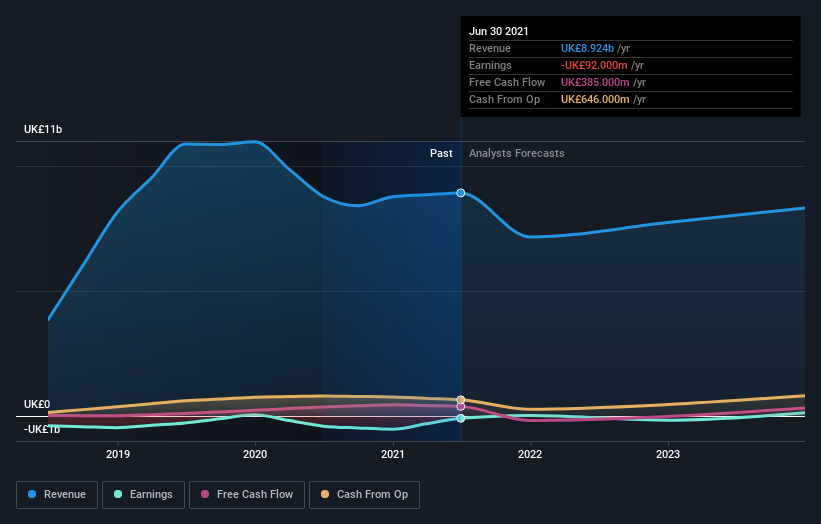Even after rising 3.1% this past week, Melrose Industries (LON:MRO) shareholders are still down 14% over the past five years
The main aim of stock picking is to find the market-beating stocks. But even the best stock picker will only win with some selections. At this point some shareholders may be questioning their investment in Melrose Industries PLC (LON:MRO), since the last five years saw the share price fall 27%. The falls have accelerated recently, with the share price down 20% in the last three months.
While the stock has risen 3.1% in the past week but long term shareholders are still in the red, let's see what the fundamentals can tell us.
View our latest analysis for Melrose Industries
Given that Melrose Industries didn't make a profit in the last twelve months, we'll focus on revenue growth to form a quick view of its business development. Shareholders of unprofitable companies usually expect strong revenue growth. Some companies are willing to postpone profitability to grow revenue faster, but in that case one does expect good top-line growth.
Over five years, Melrose Industries grew its revenue at 37% per year. That's well above most other pre-profit companies. Shareholders are no doubt disappointed with the loss of 5%, each year, in that time. So you might argue the Melrose Industries should get more credit for its rather impressive revenue growth over the period. If that's the case, now might be the smart time to take a close look at it.
You can see how earnings and revenue have changed over time in the image below (click on the chart to see the exact values).
We consider it positive that insiders have made significant purchases in the last year. Even so, future earnings will be far more important to whether current shareholders make money. If you are thinking of buying or selling Melrose Industries stock, you should check out this free report showing analyst profit forecasts.
What About Dividends?
As well as measuring the share price return, investors should also consider the total shareholder return (TSR). The TSR incorporates the value of any spin-offs or discounted capital raisings, along with any dividends, based on the assumption that the dividends are reinvested. It's fair to say that the TSR gives a more complete picture for stocks that pay a dividend. We note that for Melrose Industries the TSR over the last 5 years was -14%, which is better than the share price return mentioned above. This is largely a result of its dividend payments!
A Different Perspective
Melrose Industries shareholders are down 7.6% for the year (even including dividends), but the market itself is up 15%. Even the share prices of good stocks drop sometimes, but we want to see improvements in the fundamental metrics of a business, before getting too interested. Regrettably, last year's performance caps off a bad run, with the shareholders facing a total loss of 3% per year over five years. We realise that Baron Rothschild has said investors should "buy when there is blood on the streets", but we caution that investors should first be sure they are buying a high quality business. It's always interesting to track share price performance over the longer term. But to understand Melrose Industries better, we need to consider many other factors. To that end, you should be aware of the 1 warning sign we've spotted with Melrose Industries .
If you like to buy stocks alongside management, then you might just love this free list of companies. (Hint: insiders have been buying them).
Please note, the market returns quoted in this article reflect the market weighted average returns of stocks that currently trade on GB exchanges.
Have feedback on this article? Concerned about the content? Get in touch with us directly. Alternatively, email editorial-team (at) simplywallst.com.
This article by Simply Wall St is general in nature. We provide commentary based on historical data and analyst forecasts only using an unbiased methodology and our articles are not intended to be financial advice. It does not constitute a recommendation to buy or sell any stock, and does not take account of your objectives, or your financial situation. We aim to bring you long-term focused analysis driven by fundamental data. Note that our analysis may not factor in the latest price-sensitive company announcements or qualitative material. Simply Wall St has no position in any stocks mentioned.

 Yahoo Finance
Yahoo Finance 
